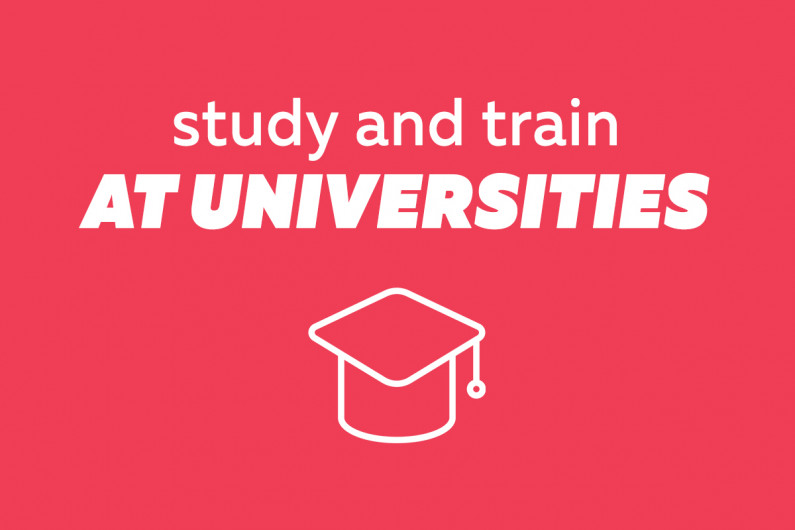Study and train at universities

Tertiary study at university offers degrees and diplomas
What's on this page?
University study develops thinking and other skills you can use for your whole career, no matter what direction you take.
What university study involves
A university programme develops skills like thinking, reasoning, communication and research. You’ll be able to use these skills throughout your career and in many types of mahi.
You can attend university full time or part time, and complete many programmes by distance or online learning.
What you do as a university student
As a university ākonga you:
- manage your own studies
- go to lectures and tutorials that help you understand the subject
- gather extra information from textbooks and online sources
- complete assignments on your own or in a group
- sit written exams to show what you’ve learned.
In some programmes you might do practical work in a lab or in the field, or do a big research project.
What you get from a university programme
Most university students sign up for a three-year Bachelor’s degree like a Bachelor of Arts (BA) or Bachelor of Science (BSc). If you do well, your university may invite you to do another year of study to earn a Bachelor Honours degree.
Once you graduate with a Bachelor’s degree you can do postgraduate study. This could be a Level 8 certificate or diploma, a Level 9 Master’s degree or a Level 10 Doctoral degree (PhD).
If you want to try out university, you can complete a Level 5 or 6 certificate or diploma in one or two years. These may contribute to a Bachelor’s degree if you decide to carry on.
University will make you an expert in your chosen subjects – and will develop thinking and self-management skills that will help you succeed wherever you work. It will also prepare you for leadership roles.
Ten years after graduating, people with Bachelor’s degrees usually earn 67% more than the average income. However, other factors can affect your earnings such as which subjects you study.
What you can study and where
There are eight universities in Aotearoa New Zealand.
Seven offer a broad range of subjects including arts, sciences, business, engineering, law and social sciences. Lincoln University specialises in subjects linked to agriculture.
All our universities rank highly in the top universities of the world.
- University of Auckland website
- AUT website
- University of Waikato website
- Massey University website
- Victoria University of Wellington website
- University of Canterbury website
- Lincoln University website
- University of Otago website
To see the major subjects on offer at each university under the various Bachelor’s qualifications, check out this guide.
What you need to get into university
To enrol at a New Zealand university you usually need University Entrance (UE). Your school record of achievement will say if you have UE.
School-leaver qualifications
If you did NCEA at school, your UE is made up of:
- NCEA Level 3
- 3 approved NCEA subjects at Level 3 with 14 credits in each
- 10 literacy credits at Level 2 or above – 5 credits in reading and 5 in writing
- 10 approved numeracy credits at Level 1 or above.
- NZQA website - approved subjects for University Entrance
Other school-leaver qualifications are also accepted for UE, such as Cambridge Assessment International Education and International Baccalaureate.
Getting in without UE
If you’re 20 or older, you may be able to apply for special admission.
If you left school at Year 12, you can apply for entrance based on your Year 12 results.
Find out more
- Visit the university’s website to check entry and programme requirements.
- Universities New Zealand website - other school-leaver qualifications
Getting ready for university
There’s a lot to think about in the year before you start university – not just what you want to study but where you’ll live and how you’ll pay for it.
This timeline tells you what you need to think about and what order to do things in.
Support at university
There’s plenty to figure out when you start university. No need to worry – there’s lots of support available.
Every university has a team of people to help you choose a programme and get enrolled. They can help you swap subjects or restructure your course if you change your mind. Search the university website to find out who to contact about student services.
Universities also have support services and networks to make life easier while you’re an ākonga. Check the website to see what’s on offer like libraries, help with learning, Māori and Pacific support, and financial support.
If you have questions or worries about lecture material or coursework, you can ask your lecturer or tutor for advice.
Find out more
Updated 22 Apr 2022